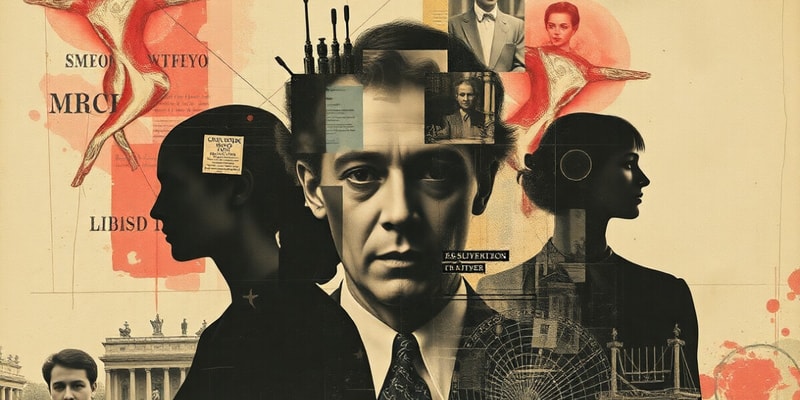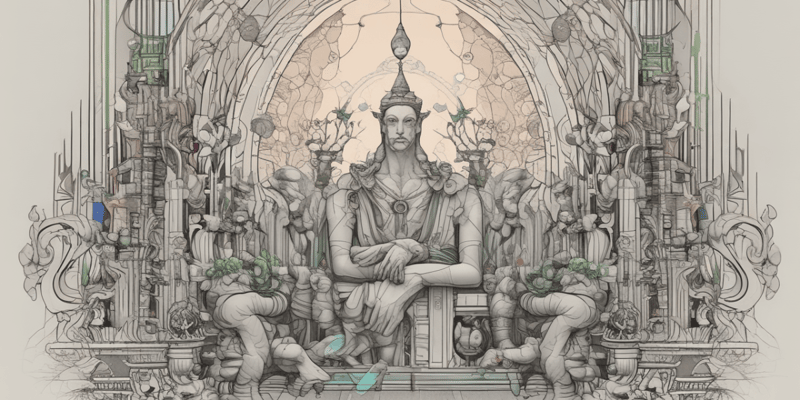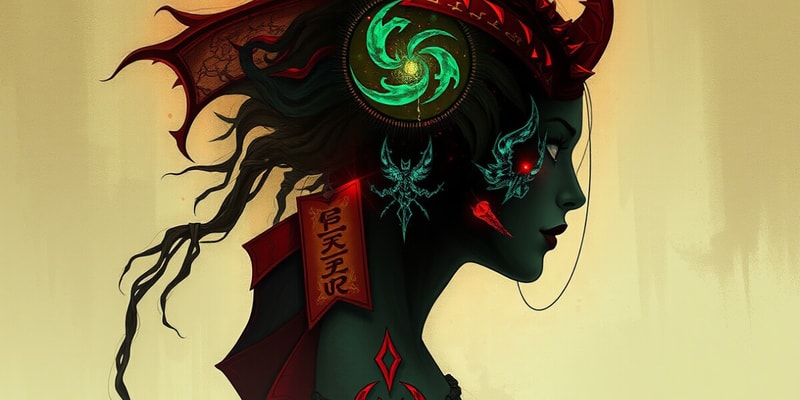Podcast
Questions and Answers
What is the definition of deviance?
What is the definition of deviance?
How do deviance and crime differ?
How do deviance and crime differ?
Which of the following statements is true regarding changing notions of deviance?
Which of the following statements is true regarding changing notions of deviance?
What is the primary purpose of social control?
What is the primary purpose of social control?
Signup and view all the answers
What are positive sanctions?
What are positive sanctions?
Signup and view all the answers
Which of the following is an example of a formal sanction?
Which of the following is an example of a formal sanction?
Signup and view all the answers
Which of the following illustrates how deviance doesn't always align with punishment?
Which of the following illustrates how deviance doesn't always align with punishment?
Signup and view all the answers
Which of the following statements best describes the relativity of deviance?
Which of the following statements best describes the relativity of deviance?
Signup and view all the answers
What is the primary focus of functionalism regarding deviance?
What is the primary focus of functionalism regarding deviance?
Signup and view all the answers
According to Robert Merton's Strain Theory, what does 'innovation' mean?
According to Robert Merton's Strain Theory, what does 'innovation' mean?
Signup and view all the answers
What is a key insight of the social disorganization theory?
What is a key insight of the social disorganization theory?
Signup and view all the answers
How does conflict theory explain deviance?
How does conflict theory explain deviance?
Signup and view all the answers
What is the concept of master status in relation to labeling theory?
What is the concept of master status in relation to labeling theory?
Signup and view all the answers
What techniques of neutralization involves attributing blame to an external factor?
What techniques of neutralization involves attributing blame to an external factor?
Signup and view all the answers
What societal factors are commonly linked to higher crime rates in social disorganization theory?
What societal factors are commonly linked to higher crime rates in social disorganization theory?
Signup and view all the answers
In the context of deviance, how is 'retreatism' defined in Merton's Strain Theory?
In the context of deviance, how is 'retreatism' defined in Merton's Strain Theory?
Signup and view all the answers
What type of sanctions involve formal actions to enforce societal norms?
What type of sanctions involve formal actions to enforce societal norms?
Signup and view all the answers
How can the development of social policies affect views on voting rights for felons?
How can the development of social policies affect views on voting rights for felons?
Signup and view all the answers
What does the term 'differential association' refer to in the context of deviance?
What does the term 'differential association' refer to in the context of deviance?
Signup and view all the answers
What shift in societal attitude regarding marijuana usage has occurred over time?
What shift in societal attitude regarding marijuana usage has occurred over time?
Signup and view all the answers
What role does punishment play in the functionalist view of deviance?
What role does punishment play in the functionalist view of deviance?
Signup and view all the answers
Which of the following is an example of an informal sanction?
Which of the following is an example of an informal sanction?
Signup and view all the answers
What principle does Strain Theory suggest when individuals lack legitimate means?
What principle does Strain Theory suggest when individuals lack legitimate means?
Signup and view all the answers
Which theory explains that crime is more likely in communities with weak social ties?
Which theory explains that crime is more likely in communities with weak social ties?
Signup and view all the answers
What does the Control Theory propose regarding social bonds?
What does the Control Theory propose regarding social bonds?
Signup and view all the answers
According to Conflict Theory, what is the primary reason for deviance?
According to Conflict Theory, what is the primary reason for deviance?
Signup and view all the answers
What is a defining characteristic of hate crimes?
What is a defining characteristic of hate crimes?
Signup and view all the answers
Which of the following systems provides detailed data on each crime?
Which of the following systems provides detailed data on each crime?
Signup and view all the answers
What is the role of judges in the U.S. criminal justice system?
What is the role of judges in the U.S. criminal justice system?
Signup and view all the answers
What does the term 'racial profiling' refer to in policing?
What does the term 'racial profiling' refer to in policing?
Signup and view all the answers
Victimless crimes are characterized by which of the following?
Victimless crimes are characterized by which of the following?
Signup and view all the answers
What key concept of the Power Elite Theory suggests about deviance?
What key concept of the Power Elite Theory suggests about deviance?
Signup and view all the answers
The Uniform Crime Reports are published by which organization?
The Uniform Crime Reports are published by which organization?
Signup and view all the answers
What is a significant issue impacting the reporting of hate crimes?
What is a significant issue impacting the reporting of hate crimes?
Signup and view all the answers
Which of the following describes the challenges individuals face during reentry after incarceration?
Which of the following describes the challenges individuals face during reentry after incarceration?
Signup and view all the answers
What effect have 'three strikes' laws had on incarceration rates?
What effect have 'three strikes' laws had on incarceration rates?
Signup and view all the answers
Study Notes
Deviance and Social Control
- Deviance is a violation of established norms, ranging from minor social faux pas to major crimes.
- Deviance is a broader concept than crime; all crimes are deviant, but not all deviant behavior is criminal.
- The definition of deviance is relative and changes over time and across cultures.
- Social control refers to the regulation and enforcement of norms to maintain social order.
- Sanctions are the means of enforcing social control, including both positive (rewards) and negative (punishments).
- Formal sanctions are official recognitions of norm violations, while informal sanctions are less formalized reactions within social interactions.
Theoretical Perspectives on Deviance and Crime
-
Functionalism: Views deviance as a necessary part of society, challenging norms and contributing to social change.
- Émile Durkheim argued that deviance reinforces societal norms and strengthens social order.
- Robert Merton's Strain Theory proposes that deviance occurs when there is a gap between societal goals and legitimate means to achieve them, leading to five responses: conformity, innovation, ritualism, retreatism, and rebellion.
- Social Disorganization Theory: Crime is more likely in communities with weak social ties and low social control, often linked to poverty and social disruption.
-
Conflict Theory: Deviance is seen as a result of social inequalities, where the powerful control the rules and benefit from the system's structure.
- Karl Marx argued that the bourgeoisie use power to maintain their dominance, leading to inequality and deviance.
- C. Wright Mills' Power Elite Theory suggests a small group of powerful individuals influence what is considered deviant and enjoy greater impunity.
-
Symbolic Interactionism: Deviance is a product of how behaviors are labeled and interpreted.
- Edwin Lemert's Labeling Theory distinguishes primary deviance (minor violations) from secondary deviance (deviance resulting from being labeled).
- Techniques of Neutralization (Sykes and Matza) explain how people justify deviant behavior.
- Differential Association Theory (Edwin Sutherland) proposes that deviance is learned through interactions with others.
- Control Theory (Travis Hirschi) argues that strong social bonds prevent deviance due to attachment, commitment, involvement, and belief.
Crime and the Law
- Crimes are acts that violate official laws and are punishable by formal sanctions.
- Crimes can be categorized into violent crimes, nonviolent crimes, corporate crimes, and victimless crimes.
- Hate crimes are motivated by prejudice based on race, religion, sexual orientation, or other characteristics.
- Crime statistics are collected through the Uniform Crime Reports (UCR), National Incident-Based Reporting System (NIBRS), and National Crime Victimization Survey (NCVS).
- The US Criminal Justice System comprises police, courts, and the corrections system.
- The police enforce laws, courts decide legal matters, and the corrections system oversees individuals convicted of crimes.
- Policing has faced scrutiny regarding racial profiling, mass incarceration, and police shootings, leading to public discussions about social justice and reform.
- The US has a high incarceration rate, with trends in imprisonment and alternative sentencing methods like probation and parole.
- Reentry for individuals leaving prison or parole can be challenging, facing strict conditions and social stigma.
Studying That Suits You
Use AI to generate personalized quizzes and flashcards to suit your learning preferences.
Description
This quiz explores the concepts of deviance and social control, emphasizing how deviance varies across cultures and time. Understand the role of social norms and the function of sanctions, both formal and informal, in maintaining social order. Dive into key theoretical perspectives on deviance, including Functionalism and Strain Theory.




